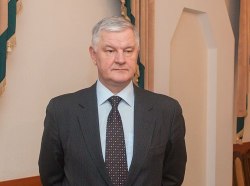Relations between Chisinau and Tiraspol have reached their lowest point, while the existing negotiation formats are either paralyzed or do not take any effect. At the same time, today there are no political leaders and Government in Moldova capable of conducting a serious dialogue with Pridnestrovie and moving towards an end to the conflict. That is how Anton Shvets, the author of Regional Trend Analytics portal, in whose opinion it is Chisinau that only interferes with international efforts to resolve the Moldovan-Pridnestrovian conflict, sees it.
The author notes the increased attention among international experts and countries participating in the negotiation process to relations between Moldova and Pridnestrovie. For example, today representatives of mediators and observers are on a visit to Moldova and Pridnestrovie. At the expert level on the Pridnestrovian settlement, an American-Russian dialogue is also under way.
“The meeting of the Presidents of Russia and the United States, scheduled in two weeks, will obviously be devoted to more global and ambitious issues, yet the topic of the future of Pridnestrovie can also be touched upon there as one of the few points for a redeemable search for a compromise,” the author of RTA notes.
However, Chisinau has a bad habit of missing the chances given to it, the expert says.
“The constant political crisis, unreliable structures of power that are not credible for individual or all international partners at once, endless elections accompanied by irresponsible geopolitical slogans do not help key external factors to form a consolidated approach to settlement. In addition, even this approach may turn out to be useless in practical terms due to the absence of political leaders and Government in Moldova, capable of conducting a serious dialogue with Tiraspol and moving towards ending the conflict,” RTA writes.
The expert emphasizes that the resolution of the Moldovan-Pridnestrovian conflict through diplomatic negotiations may require unprecedented flexibility, responsibility and even “manual control” of individual processes.
“Any steps must be predictable, fair and resilient to criticism of political forces that are not involved in power. In today's Moldova, this is simply impossible,” the author notes.
On the contrary, what is happening in relations between the two banks of the Dniester demonstrates moving away from the final settlement. The expert cites as an example all the new restrictions imposed by Chisinau in the banking sector, in the field of communications, economics, trade and transport. He also talks about incidents in the Security Zone.
These phenomena, as noted by the RTA expert, cause concern in Moscow.
“It is obvious that the Kremlin is not going to accept such parameters of the deal, under which the population of Pridnestrovie, including the large Russian diaspora living there, will be limited in rights or deprived of a reliable channel of communication with Russia. Moreover, Moscow is unlikely to support any uncoordinated obstacles to the peacekeeping mission activities,” the author believes.








